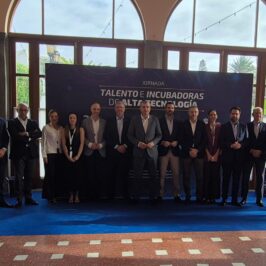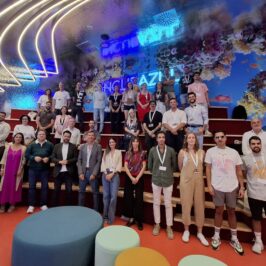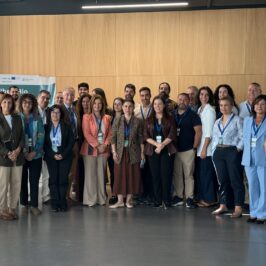
Alfonso, first of all, congratulations on having achieved that your sustainability certificate meets the Travalyst criteria. What does it mean for Tudestino Sostenible to be recognized by a global coalition like Travalyst, led by such important brands in the sector?
Thank you so much. For us it is a very important milestone in this stage of growth and consolidation of our sustainability certificate. Your sustainable destination and, especially, for our standard of accommodation.
Travalyst is an international organization created by the main OTAS such as Google, Booking, Amadeus, Expedia... that works to promote tourism initiatives with less negative impact. One of its lines of work, for the sake of transparency, is the recognition of ecolabels and certificates that recognize models with positive impact.
Establishments that obtain certifications recognized by Travalyst will be listed in these OTAs as accommodations with a validated sustainability certificate.
Only a few certifications worldwide have managed to pass this process. Being on this list supports the work developed in these years and reinforces our vision of how tourism companies should work on sustainability, also generating trust and credibility in our clients.
In addition, it expands our reach, allows us to be part of a global community of worldwide certifications and helps us contribute to companies working towards more responsible and sustainable tourism.
The Tudestino Sostenible standard has been reviewed and approved in accordance with Travalyst criteria. What was the review process like and what key aspects were taken into account to obtain this approval?
It is a fairly rigorous and detailed process, which is based on 3 main criteria:
Independence in the audit process is independent, that the standard and its criteria are accessible and publicly available and that it evaluates the impact of social, economic and environmental factors, among others, included in the 17 Sustainable Development Goals of the United Nations, but not limited to them.
It lasts several months and both the standard and the certification procedures are audited.
For us, it has been an intense and very interesting experience, which has allowed us to verify that our transversal vision of sustainability and our work procedures were correctly designed and aligned with the vision of the tourism industry.
How do you think this validation by Travalyst will help increase the credibility of your certificate among accommodations and travel booking platforms that seek to promote more responsible tourism?
Obtaining validation of this type, carried out by an organization as important as Travalyst, has a very positive impact on the credibility of our certificate.
It gives us worldwide recognition and validation that can be very attractive for those accommodations that seek to stand out in such a competitive market. It also increases the confidence of our clients in our standard, by being included in a list of certificates that truly meet high sustainability standards.
Tudestino Sostenible's mission is to help establishments advance in their transition towards sustainability. What are the biggest challenges that tourist accommodations and destinations face when trying to meet environmental, social and economic sustainability standards?
The greatest challenge or difficulty that establishments face is establishing a roadmap, clear and adapted to their reality, to manage the sustainability of their businesses.
As a general rule, they lack management models that allow them to design the transition you mention and prioritize work objectives. Or they have models that do not faithfully reflect what happens in their facilities, which makes their implementation difficult later.
Also the continuous effort involved in keeping up to date with regulations and standards, as well as the difficulty of communicating sustainability management models internally.
Given that Travalyst's list of approved certifications will be used by major OTAs (Online Travel Agencies), how do you expect this visibility to drive the growth and adoption of the Tudestino Sostenible certificate in the global tourism market?
We hope that the visibility provided by being on the Travalyst list will have a significant impact on the growth of our Sustainable Tudestino Standard in the global tourism market and especially in the hotel sector.
This validation generates credibility in our standard and an increase in our clients' confidence in our services.
In addition, it allows us to be part of a community of certifications that collaborate with Travalyst itself so that our procedures are aligned with the best practices and tourism sustainability initiatives.
Tudestino Sostenible bases its standards on the UN Sustainable Development Goals. In what way does your certification specifically contribute to the fulfillment of these objectives and how do you evaluate the impact of certified properties on the 2030 Agenda?
Our certification and standards evaluate different aspects of establishment management with a transversal vision of sustainability. That is, taking into account the environmental, economic and social aspects of that activity.
These management areas evaluated are directly related to one or several UN Sustainable Development Goals (SDGs). With our certification, establishments know their contribution to the SDGs and have a roadmap to improve it.
What next steps is Tudestino Sostenible taking to continue innovating in promoting sustainability in the tourism sector? Are there any new projects or approaches you would like to share with us?
At Tudestino Sostenible we are in a phase of growth and consolidation of certification.
We are exploring avenues for collaboration and alliances with different technology startups that are developing innovative solutions for sustainable tourism.
We have also created a sustainability forum to improve training and internal communication for establishments that are within our certification program. We also actively participate in events and conferences on sustainable tourism, sharing experiences and learning from other initiatives with which we coincide at these events.
And we are working on developing our digital platform that will allow establishments to evaluate and improve their sustainability practices more efficiently.
These steps and projects reflect our continued commitment to innovation and the promotion of more responsible and sustainable tourism.
What role does education and awareness of both travelers and tourism service providers play in your strategy to promote sustainable practices? How do you get more accommodations and destinations to understand the importance of being sustainable?
Education and awareness are essential to promote more responsible and sustainable tourism.
In the case of organizations, it is impossible to implement sustainability management models without fluid internal communication and a training program for their staff.
During the certification process, we try to help companies discover that working on the sustainability of their businesses has a positive impact on their organizations and not only at the level of image or external communication.
That investing in sustainability makes them more efficient, better organized establishments, and improves their internal communication processes.
Do you think that being part of the Travalyst network can open doors for new strategic alliances? What type of collaboration do you hope to establish with other actors in the tourism sector to promote sustainable tourism?
Being part of this network opens doors for new strategic alliances with Travalyst itself and other organizations.
Some have begun to occur, such as active collaboration with companies that manage the sustainability data of accommodation OTAs.
Also with the rest of the certifications that make up the list and with startups that develop initiatives that improve the sustainability of establishments.
Without a doubt, it places us in a very interesting position to be able to create synergies with other organizations and collaborate with other actors in the tourism sector in the promotion and adoption of sustainable practices.
Alfonso, what role has your participation in Incubazul and the Cádiz Free Zone played in the path towards the approval of the Sustainable Tudestino certificate by Travalyst? What type of support or key resources did you receive that helped you reach this milestone?
We always say that entering Incubazul and the support of the Cádiz Free Trade Zone for our initiative has been crucial to developing our certification.
Tudestino Sostenible exists because we entered the right incubator that provided us with the advice and mentoring we needed.
Furthermore, by being part of the first batch, we have grown at the same time and it has allowed us to have that feeling of being an active part of this initiative from the first moment.
With respect to Travalyst, it has accompanied us at all times, providing advice, access to financing, contacts, visibility...
Therefore, our participation in Incubazul and the Cádiz Free Trade Zone provided us with the resources, support and network necessary to develop and validate our sustainability certificate, culminating in its approval by Travalyst.









